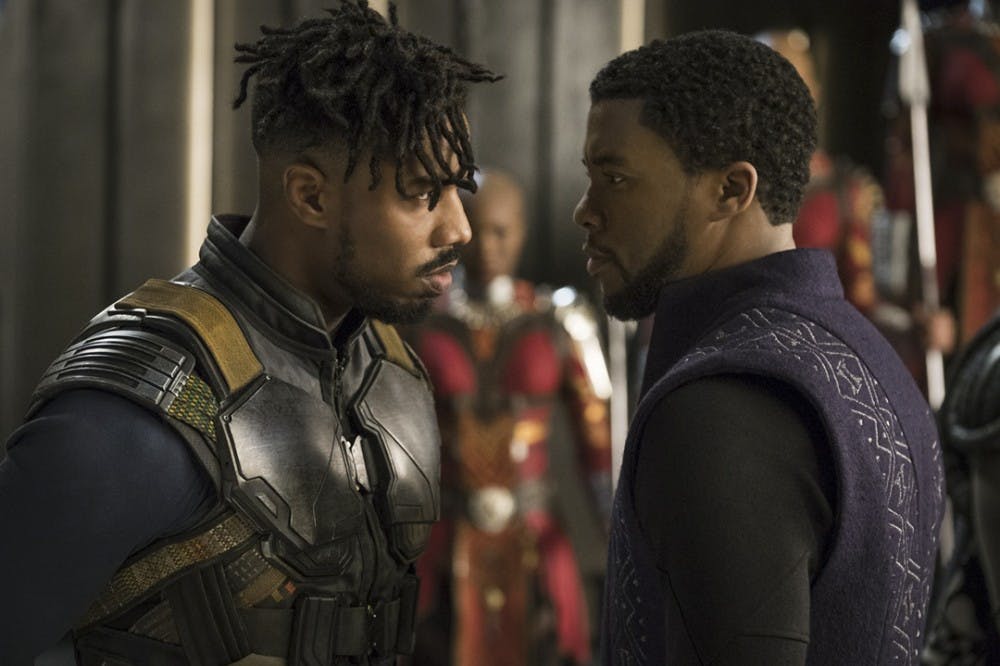The movie the world has been waiting for is finally here: "Black Panther." South Carolina native Chadwick Boseman portrays Marvel's iconic superhero who's newest to the big screen. First seen in "Captain America: Civil War" in 2016, the Black Panther gets his solo story — with the incredible background of his African kingdom, Wakanda.
So who is the face behind the Black Panther mask? A prince named T'Challa from the country of Wakanda. The story follows T'Challa's journey of becoming king following his father's death. His home country is seen as third-world to the rest of humanity, but it has an important secret — it's actually the most technologically-advanced country in the world, thanks to its abundant source of vibranium.
Vibranium is a fictional metal in the Marvel universe used to make a lot of cool toys for the Wakandans — making it a technological utopia hidden to the world. The brains behind all of T'Challa's tech (including his Black Panther suit) is his sister Shuri, a tech-savvy teenager played by Letitia Wright.
After T'Challa becomes king, he finds that villain Ulysses Klaue, an evil arms dealer cynically portrayed by Andy Serkis, has stolen vibranium from a Wakandan artifact in a museum. Newly crowned, T'Challa goes to find Klaue on a mission to South Korea to stop his evil actions and return his country's precious vibranium. We later find out that the true villain is not Klaue, but is instead quite unlikely — an American with a Wakandan background, Erik Killmonger. Killmonger, a former Navy SEAL who claims to have killed in the United States, Afghanistan and Iraq is played by Michael B. Jordan.
It would be simply wrong to discuss this movie without mentioning the powerful women that play vital roles in the film. As mentioned before, Shuri is the brains behind the Black Panther. Without her, he would be nothing. She's incredibly smart yet does exactly what a little sister should — brings out a lighthearted side of T'Challa and brightens any room with her charming sense of humor.
Besides Shuri, women basically rule Wakanda. The Dora Milaje are the Black Panther's bodyguards — the superior women recruited from each tribe of Wakanda. While watching the movie, I found parallels between the Dora Milaje to the Amazon women from "Wonder Woman" in the DC Comics universe. T'Challa's love interest Nakia (Lupita Nyong'o) and Dora Milaje member Okoye (Danai Gurira) prove to be the heroines of the film as they assist T'Challa on his mission to find Klaue, and later help him defeat Killmonger.
The film provides vibrant and wonderful imagery. The outside world sees Wakanda as a peaceful, grassy African country, but to insiders it's a world filled with technology. We see modern inventions like monorails and skyscrapers, while simultaneously keeping African tradition. When T'Challa is crowned king, the different tribes surround him on a mountain in colorful, traditional clothing as the new Black Panther stands on the edge of a waterfall.
The film made $25 million from Thursday's preview night alone. Compared to other Marvel Cinematic Universe movies, it is tied with "Captain America: Civil War" for second-highest preview gross, falling right behind "Avengers: Age of Ultron" with $27.6 million.
Does it live up to the hype? Absolutely.
Part of what makes this film so amazing is the racial representation. This is one of the first blockbuster films to feature a majority black cast with multiple characters in positions of power. It is important for people, especially children, to see themselves represented in movies and identify with strong characters. "Black Panther" gives black children the opportunity to experience that in a way most superhero movies don't.
The Black Panther character was created in 1966 by Stan Lee and Jack Kirby, both of whom supported the civil rights movement. The reason "Black Panther" is so iconic, especially for the comic's time, is that it portrays African royalty. T'Challa, a black superhero created in the '60s, was not represented stereotypically by a racist creator — this was groundbreaking.
What really stood out about the movie to me was the uniqueness of the villain Killmonger. He's one of the first villains I've seen who's not guided by greed. His character deeply contradicts that of the other villain of the movie, Klaue, whose evil nature is driven by his desire for the valuable vibranium.
What was so different about Killmonger is that I sympathized with him. His troubled character is faced with an moral dilemma that causes T'Challa himself to examine his own type of rule.
The film shows what a nation can do with wealth, and raises the question: What's the ethical decision in regards to using that wealth? "Black Panther'" is thought-provoking, revolutionary and, frankly, a good movie. The movie presents ethical dilemmas and leaves us with a promise of progress in the world, yet still gives us the awesome, classic narrative of a superhero film.

